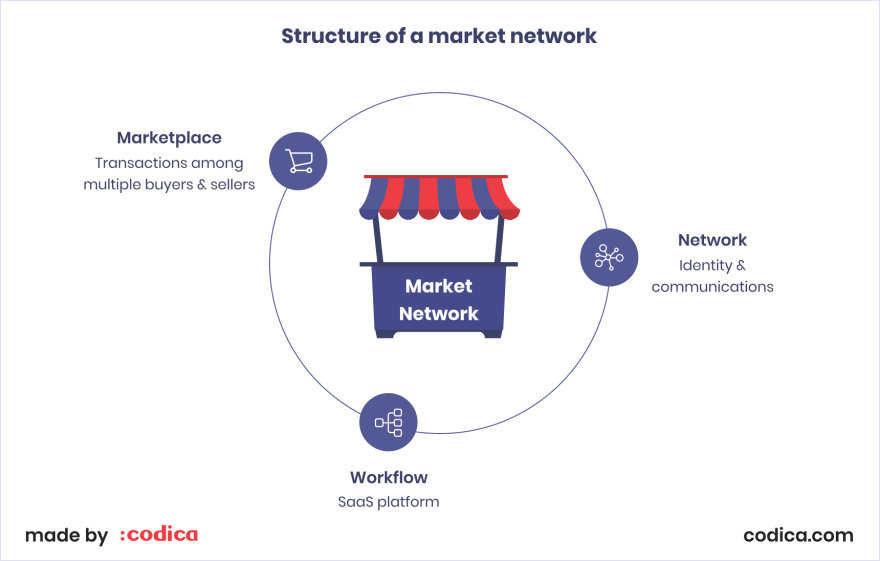This article was originally published on Codica Blog.
Disclaimer: The article is not a technical one, but we thought that the material may be interesting to the Dev.to community.
What is a market network?
The term “market network” belongs to James Currier, a Silicon Valley venture capitalist. He uses it to describe a brand-new type of online marketplaces. Currier wrote an article for the NFX blog called “The Next 10 Years Will Be About "Market Networks” with a prediction that soon all freelancers and their clients will do business on such platforms adjusted for a particular industry.
So what websites can be considered “market networks”? These are mediums combining the main features of traditional marketplaces and socials.
First, market networks should offer a specific place for customers to find the right service providers and make a transaction. That’s when they get closer to online marketplaces.
At the same time, like any other social network, these websites should allow professionals to create a profile to showcase their works and build relations with people having the same interests.
The anatomy of a great market network
All of them are similar in structure. They have specific components that distinguish such mediums from other marketplaces like Amazon or eBay.
Xinova, the first innovation market network, in their article offer the following list of features turning an online platform into a market network:
- SaaS platform
- Elements of both social networks and marketplaces
- A vast ecosystem of professionals
- Transparent working and communication processes
- Reduced transaction fees
- Simplified legal contracts.
Examples of market networks
1. AngelList
This platform unites two parties: angel investors and people looking for a job at startup companies. Naval Ravikant and Babak Nivi launched it in 2010 with the core mission of assisting startups in fundraising and talent acquisition.
2018 was a fantastic year for this market network. In their AngelList Year in Review 2018 company claimed to have reached over $1 billion in assets under management, assisted over two million candidates in finding a job, and helped entrepreneurs release more than 20,000 groundbreaking tech products.
2. Houzz
If you are contemplating the idea of redesigning your house and need qualified specialists for your project, you can find them on this house enhancement e-commerce website.
There is an extensive list of builders, plumbers, electricians, interior designers, and other service providers on Houzz. They can contact homeowners, showcase their portfolio of works, provide consultation services, and eventually get a job.
Houzz has been added to the list of 2019 CNBC Disruptors 50 companies and is worth $4 billion.
3. Liquidspace
The creator of this e-commerce website for renting office space came up with an idea of a platform for connecting individuals and organizations with real property holders.
Everyone can list their property and set the desired price. Listing and browsing different office spaces are completely free, but the website charges 10% per transaction.
4. StyleSeat
The core mission of StyleSeat was to help clients find relevant stylists and barbers and assist beauty masters in attracting new customers.
The company succeeded in getting $40 million of investments. According to Crunchbase, the company powered more than 100 million appointments books and $7 billion in revenue.
The key attributes of a profitable market network
Let’s specify the major differences between market networks and online marketplaces.
1. Focus on complex services
Customers use market networks to deal with complex projects rather than make a buy-sell transaction. You will agree that house redesign or event planning requires active engagement and a long partnership compared to a purchase of new clothes in any other marketplace.
2. Importance of each client and contractor
When it comes to complex services, each client is unique, and so are the specialists they collaborate with. Contractors often have particular requirements while each professional brings exceptional opinions, ideas, and experience to the table.
Identity is what can help owners of a market network get additional profit. For example, parents may want to pay a premium for a babysitter on Trusted just because they were satisfied with the services of a particular person in the past.
3. Active communication between a client and a service provider
Close cooperation between both sides of a platform is another distinctive feature of market networks. The projects there usually take pretty long to complete. Therefore, it takes more time for both parties to sort out all the details.
4. Free flow of referrals
You would not entrust your corporate party to the first specialist you have found, would you? On the contrary, you will gather lots of recommendations from friends and relatives to get the right event planner.
Positive feedback from happy customers can bring you a free flow of referrals and thus, allow you to lower acquisition costs.
5. Increase of the transaction speed and customer satisfaction
Market networks make it easier to collaborate by offering the right software. Such instruments improve the transaction velocity for both parties, increase the close rate on proposals and streamline the payment process.
Finally, these instruments make the working processes efficient and leave no room for miscommunication.
Adoption of the market network business model: winners and losers
Who will win
According to Jamer Currier, the following industries with unique specialists are best suited to the market-network business model.
- Real estate
- Travel agencies
- Investment banking
- Legal services
- Healthcare
- Event planning
- Residential construction.
Doximity shows us how market networks can transform the healthcare industry. This social networking service unites American physicians, nurse practitioners, and clinicians with the mission to increase their productivity by allowing them to share their insights into the latest healthcare trends with colleagues.
Such HIPAA-secure workflow tools as eFax service, medical newsfeed, on-call scheduling, and secure calling enable doctors to provide more comprehensive and coordinated care.
The app for iPhone and iPad looks the following way:
Who will lose
Though market networks are getting more and more popular, it's worth noting that like any disruptive idea, they will not suit all types of business.
According to Mark Schaefer, a keynote speaker, business consultant, and author, the following types of businesses are less suited for moving to market network:
- Intermediaries that collect fees for their services;
- Traditional selling businesses;
- Platforms without the ecosystem of service providers or demand aggregators.
What’s the future of market networks?
The forecasts for the future of market networks look quite optimistic. James Currier is convinced that the bright future is waiting for them.
Will his predictions come true? Only time will tell. However, it is clear that market networks have enough potential to disrupt traditional markets. At the end of the day, this new type of online marketplace platform may have a great impact on how service providers will do their job and earn a living.
This is an abstract of an article that was originally published on Codica Blog.







Top comments (0)